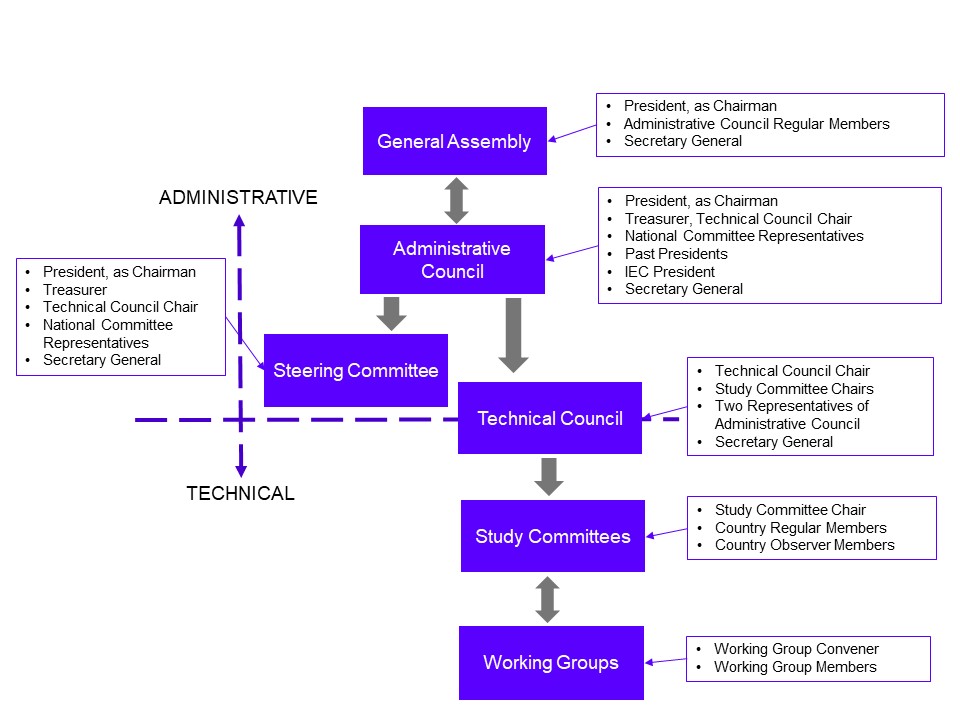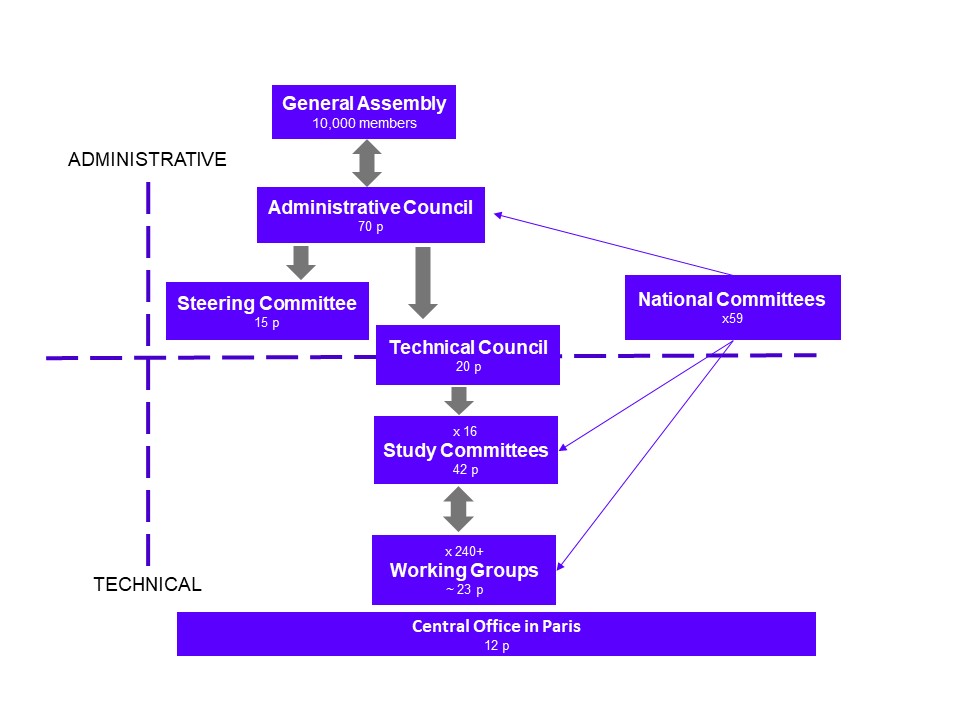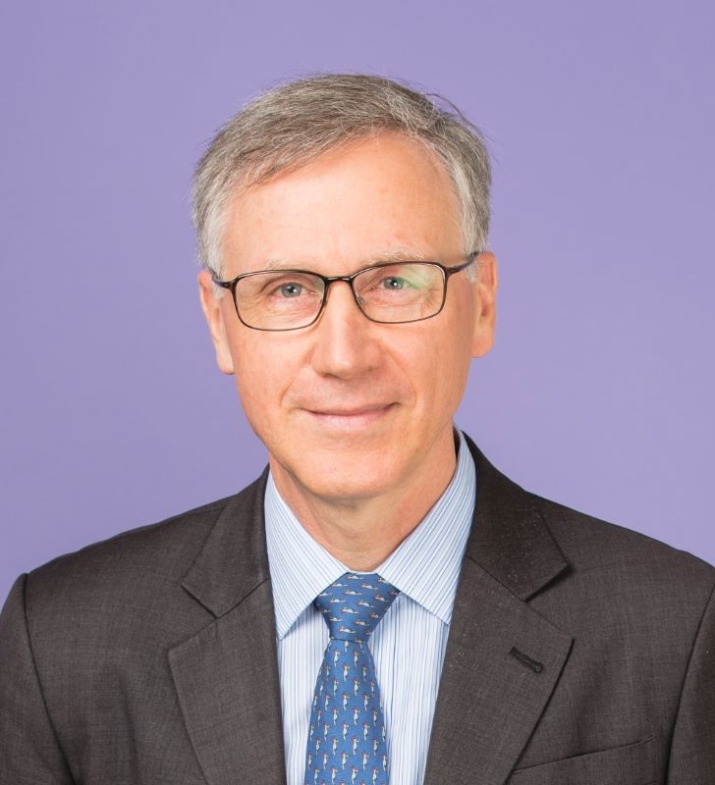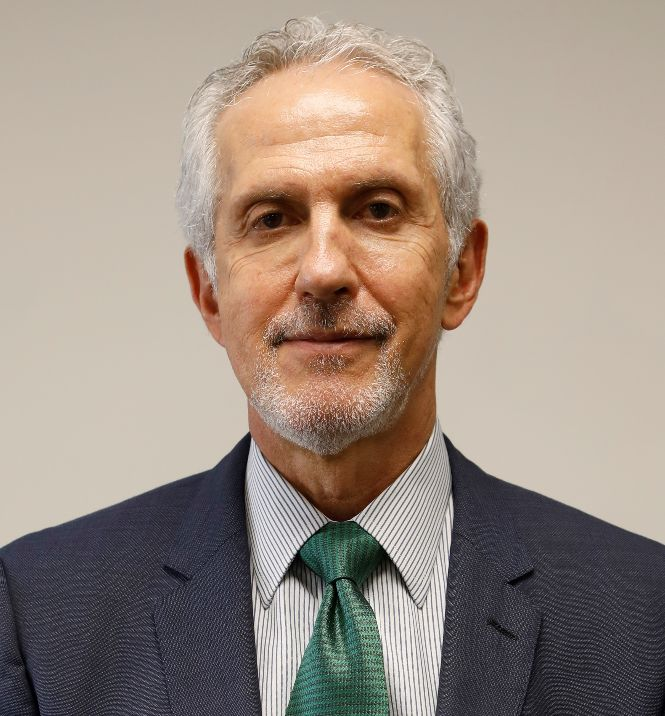Technical Committee history and development
With the continued growth and development of CIGRE’s Study Committees and Working Groups after World War II, it had become clear that a central administration and coordination was required. In 1949, a Technical Committee was created: a central body consisting of Study Committee Chairs and a Committee Chair. The first Technical Committee Chair was the President of CIGRE himself, M. Schmidt from Switzerland. One year later the role was transferred to the Vice-President of CIGRE and Delegate General, Jean Tribot-Laspiere.

This body met regularly as such up until 1966 when the official creation of the Technical Committee was incorporated in the new Statutes and its composition defined as follows:
- Three Administrative Council members, one of whom would chair the Technical Committee,
- All Study Committee Chairs,
- The Secretary General.
There is one CIGRE Technical Committee which governs the Study Committees which in turn manage their Working Groups.
The TC Objective
The objective of the TC was and is still to prepare decisions regarding the organisation of all CIGRE technical activities, and to submit them for approval to the Administrative Council. Some activities are related to overall CIGRE strategy while others are purely operational. As an example, one of the important strategic decisions presented by the TC was the structural re-organisation of the Study Committees which was implemented in 2002.
Operational activities mean coordinating the various Study Committees, ensuring that there are no overlaps in the scopes of work between individual working groups, and assisting with the preparation of the most important CIGRE events, such as the Paris Sessions and large symposia in odd years.
The Statutes define the duties of the Technical Council as follows:
- Drawing up the Technical Committee Strategic Plan which will serve as a basis for definition of the Study Committees’ fields of activity,
- Proposing, after consultation with the Steering Committee, to the Administrative Council the disbanding of a Study Committee, or the creation of a new Study Committee,
- Developing the preferential subjects for the Session and the topics for the symposia,
- Acting as a program committee for the Session and providing an assessment of the outcome of the Session,
- Keeping under review the work of the Study Committees and of the discussion meetings during the Sessions and Symposia,
- Undertaking on its own initiative, or at the request of the Administrative Council or the Steering Committee, any study relating to the functioning of the Study Committees,
- Acquainting itself with the particular needs of National Committees and Regions and ensure that these are adequately addressed.
(The duties of the Technical Council are described in more detail in the Rules of Procedure.)
Committee vs. Council
In 2017, the Technical Committee was renamed Technical Council, in order to align the name with those adopted by other international organisations. In many other organisations, such as IEC and IEEE, a technical committee is more like one of CIGRE’s working group, thus the decision to change the TC name to avoid confusion.
The Technical Committee’s position within CIGRE
CIGRE’s TC is the highest governing body for technical matters. Its members are the Chairs of the Study Committees (16 in 2021), two elected representatives of the Administrative Council, the TC Chair elected by the Administrative Council, the Secretary General and a TC Secretary selected by the TC Chair. The TC meets twice a year.
The attached figures illustrate how the TC is positioned in CIGRE’s general organisation, as well as the numbers of members in each part of the structure.


The role of the TC Chair
The role of the TC Chair is to convene the TC meetings: prepare the agenda with the Secretary General, run the meeting, and approve the meeting’s minutes.
In addition, the TC Chair has the following responsibilities:
- The TC Chair also plays an important role in the renewal of Study Committee Chairs whose terms are four or six years. With the support of the Secretary General, the TC Chair has to propose candidates to the Administrative Council based on consultation with the current Study Committee members, and on the opinion of the outgoing SC Chair.
- The TC Chair also approves every new Working Group proposed by a Study Committee after consulting the TC members.
- The TC Chair reports annually to the Steering Committee and Administrative Council.
The term of the TC Chair is four years, subject to one extension of two years by exception, on proposal of the Steering Committee.

CIGRE’s current Secretary General, Philippe Adam, joined the TC under the chairmanship of André Merlin (France), the TC Chair from 1998 to 2002.
"During that period, André MERLIN appointed a task force that I was involved in to review the organisation of the technical activities of CIGRE. At the end of his term, new Study Committees were created, some were combined, and the others had their scope of works deeply revised,” says Philippe Adam.
“The transition from the previous system with 15 Study Committees to the new current one with 16, was very challenging, because it has opened new domains for CIGRE still relevant today: power distribution, dispersed generation, electricity markets, and regulation and information systems.”
Philippe continued as TC Secretary under the chairmanship of Aldo Bolza (Italy), elected as TC Chair in 2002 up to 2006. New technical activity organisation together with a completely new format for the Paris Session were the main drivers of that period.
“I continued as TC Secretary for another 6 years after the election of Klaus Fröhlich (Switzerland) as the TC Chair. During his term the Technical Committee became a real team, where collaboration, elimination of barriers between the Study Committees, and openness were the drivers,” said Philippe.
In 2014, Philippe again joined the TC after his appointment as Secretary General of CIGRE.

The current Technical Council Chair is Marcio Szechtman, Chief Transmission Officer at Electrobras, the leader in electricity generation and transmission in Brazil.
Learn more about the CIGRE Strategic direction and technical council
